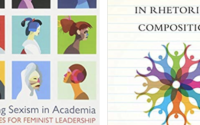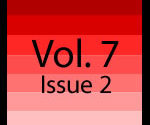Volume 8.1: The Rhetorical, the Political, and the Digital
Welcome to Present Tense Volume 8, Issue 1 (Fall 2019). As we announce the first installment of our 8th volume, we’d like to take a moment to thank everyone whose work throughout the years has contributed to our success in publishing cutting-edge rhetorical scholarship on important contemporary social and political issues. Our authors, readers, reviewers, editors, and advisors have all been responsible for building Present Tense over time, and we are so fortunate to share this work with dedicated colleagues throughout the field of writing and rhetoric studies and beyond.
Present Tense 8.1 is a general issue that represents the depth and breadth of scholarship about rhetoric in society for which we have become known. Articles in this issue explore discourses of free speech rights, presidential politics, colonial exploitation, disability and inclusion, consumer activism, and gender and feminisms. As always in Present Tense, works are deeply attuned to contemporary digital technologies through which rhetoric circulates, both in the subjects of study and the media/modes used to enact such study.
Volume 8.1 includes the following articles and reviews:
Rubén Casas’ “The Place of Free Speech: Making Controversy Material at the Neoliberal University” explores the discursive complexities and contradictions of a designated free speech area on Fresno State University’s campus, illustrating what this example shows about the state of universities and free speech more broadly.
Jonathan L. Bradshaw’s “Self-Epideictic: The Trump Presidency and Deliberative Democracy” examines President Trump’s use of self-epideictic rhetorical practices and discusses the implications of these practices for the future of deliberation in US American democracy.
T. Jake Dionne’s “Viewing Sleep Dealer as Teoria Povera in the Trump Era: Rhetorical Coloniality, Reality Television, and Water Dispossession” offers an incisive analysis of the 2008 science fiction Spanish-English film Sleep Dealer to explain the film’s trenchant messages about coloniality, reality television, minority marginaliziation, and resistance—messages particularly important today in light of contemporary US discourse surrounding borders and walls.
Janine Butler’s “Principles for Cultivating Rhetorics and Research Studies within Communities” uses data collected from three focus groups with twenty d/Deaf and hard-of-hearing college students in order to create a fuller understanding of their experiences with and perceptions about current captioning practices in various media, and ultimately offering a methodology for such community-based research.
Blake Abbott’s “Won’t You Be My Neighbor? Rhetorics of Investment Citizenship in Neighborly” investigates the rhetorical features of the civic crowdfunding site Neighborly and explores the potential of “investment citizenship” in the 21st century.
Sarah Austin’s “Sex Doesn’t Sell: Bitchmedia’s Schema for Effective Branding and Financial Viability” profiles the feminist media conglomerate Bitchmedia to demonstrate the complicated rhetorical negotiation of remaining financially solvent in the current advertising market while also remaining true to the feminist principles on which it was founded.
Megan McIntyre’s video essay “#YESALLWOMEN: Narrative Response to Gendered Violence” examines the ways women respond to acts of horrific violence against women through various movements in digital spaces in order to reclaim their embodiment and reassert their humanity through digital discourse.
Kassia Krzus-Shaw reviews Sarah Ruffing Robbins’ Learning Legacies: Archive to Action through Women’s Cross-Cultural Teaching.
Kathleen J. Ryan reviews Kirsti Cole and Holly Hassel’s (eds.) Surviving Sexism in Academia: Strategies for Feminist Leadership and Flynn and Bourelle’s Women’s Professional Lives.
Brandy Dieterle reviews danah boyd’s It’s Complicated: The Social Lives of Networked Teens and Julie Warner’s Adolescents’ New Literacies with and through Mobile Phones.
We hope you enjoy reading/viewing these works and sharing them with colleagues and students in the months and years to come.
Sincerely,
Megan Schoen, Managing Editor
Ehren Helmut Pflugfelder, Managing Editor
Caitlan Spronk, Technical Editor
Shreelina Ghosh, Multimedia Editor
Matt Cox, Annotated Bibliography Editor
Don Unger, Social Media Editor
Ryan Skinnell, Review Editor
Joshua Prenosil, Business Editor
Jessica E. Clements, Style Editor
Cristyn L. Elder, Style Editor
John Williford, Design Editor



